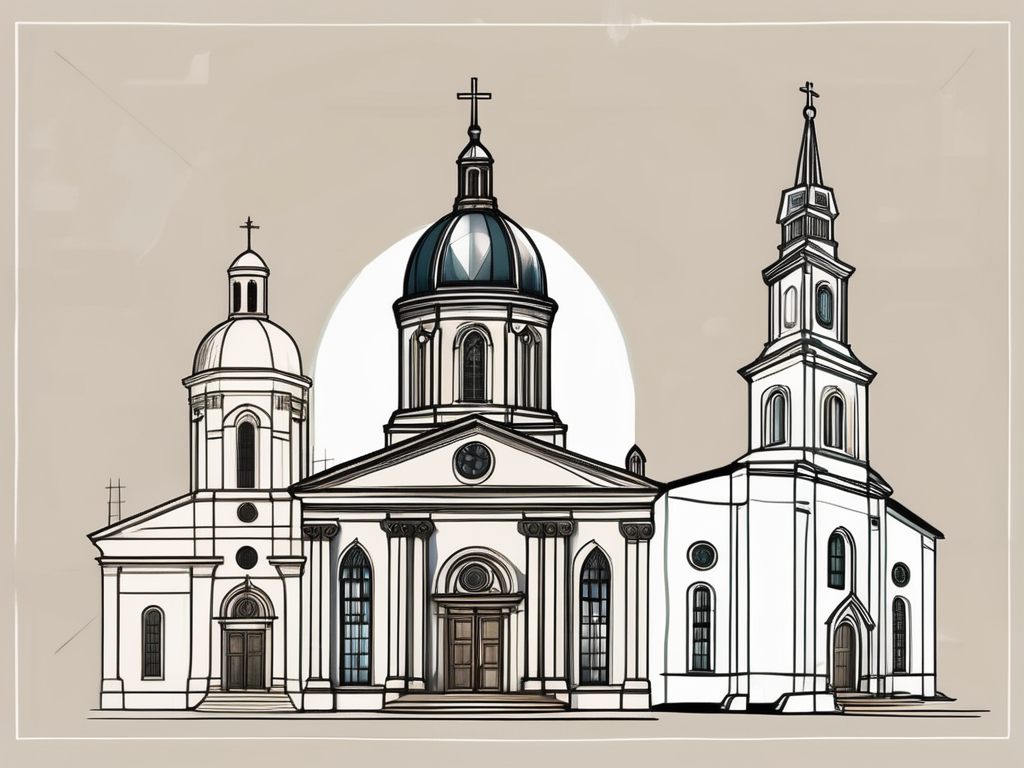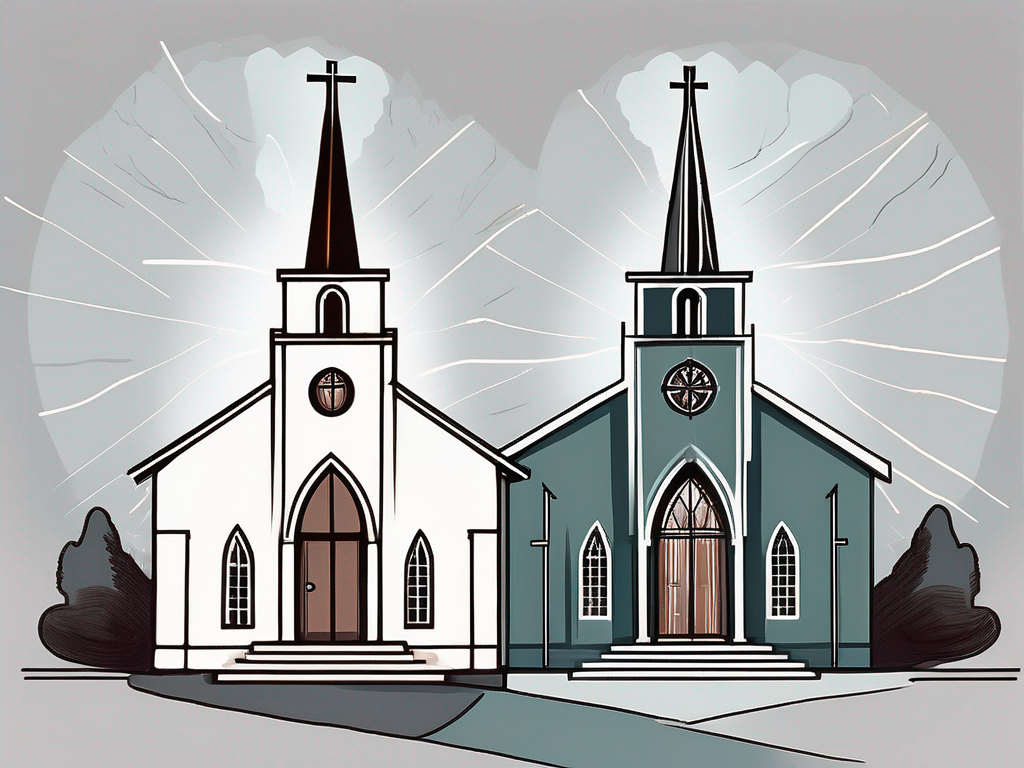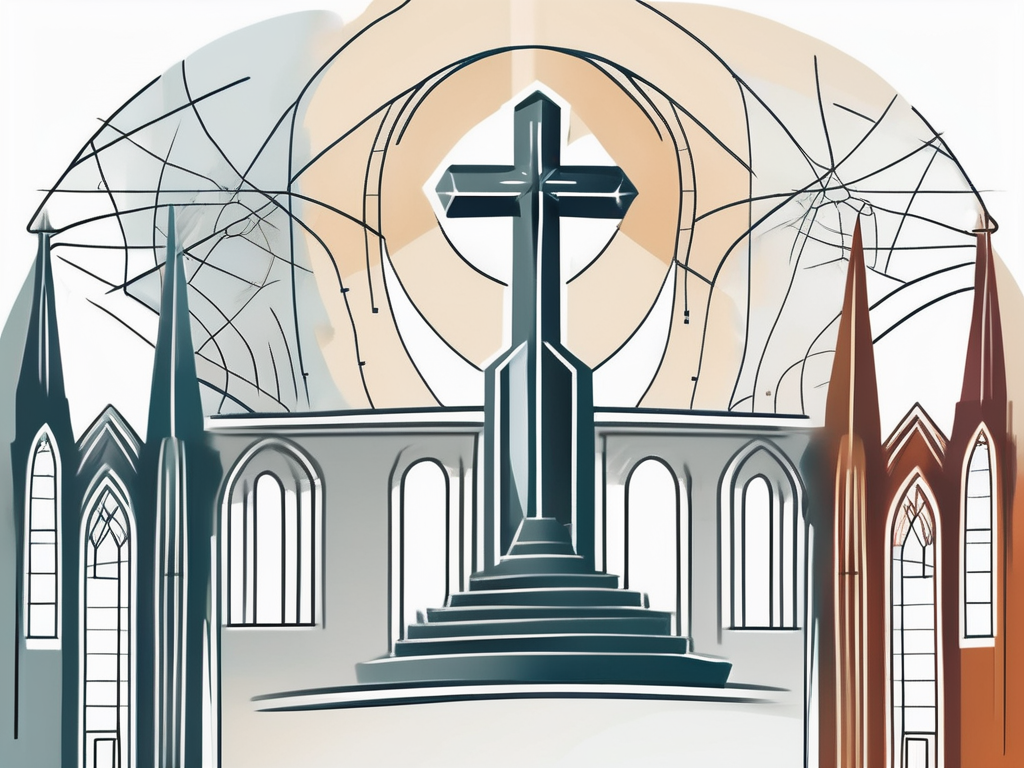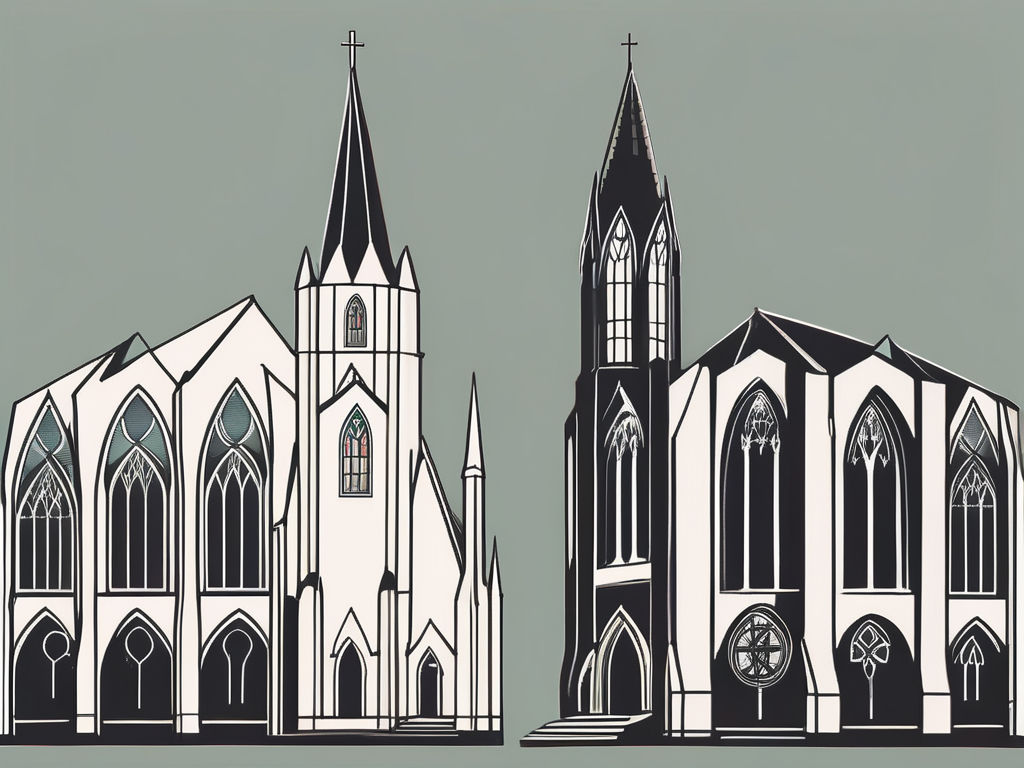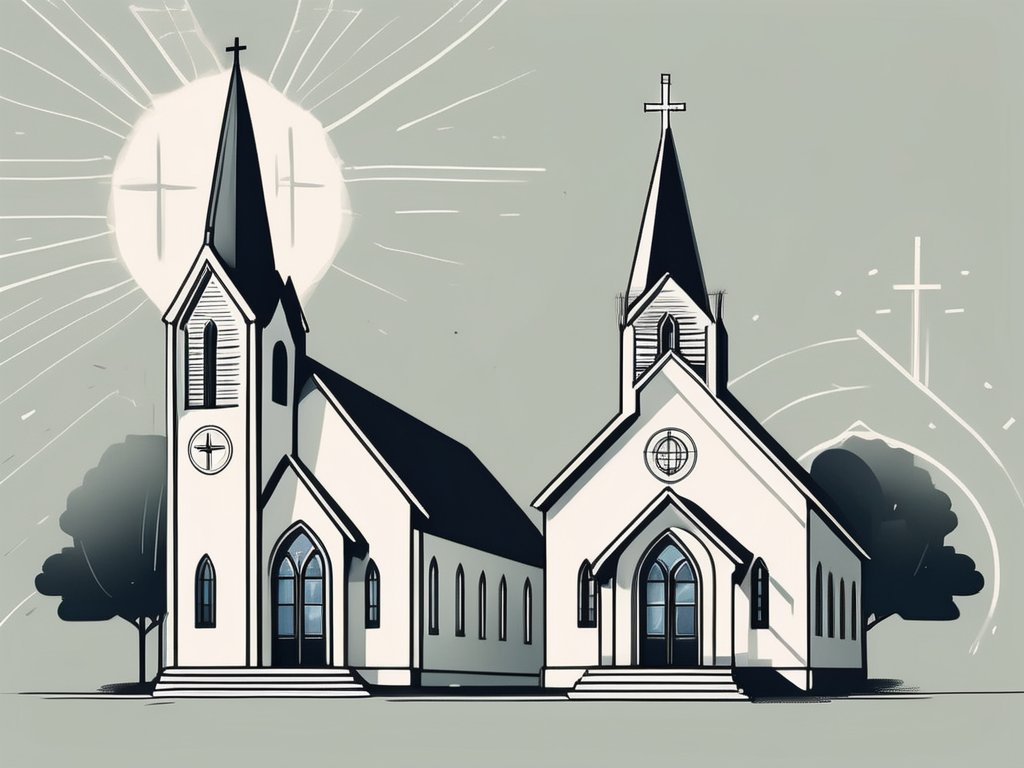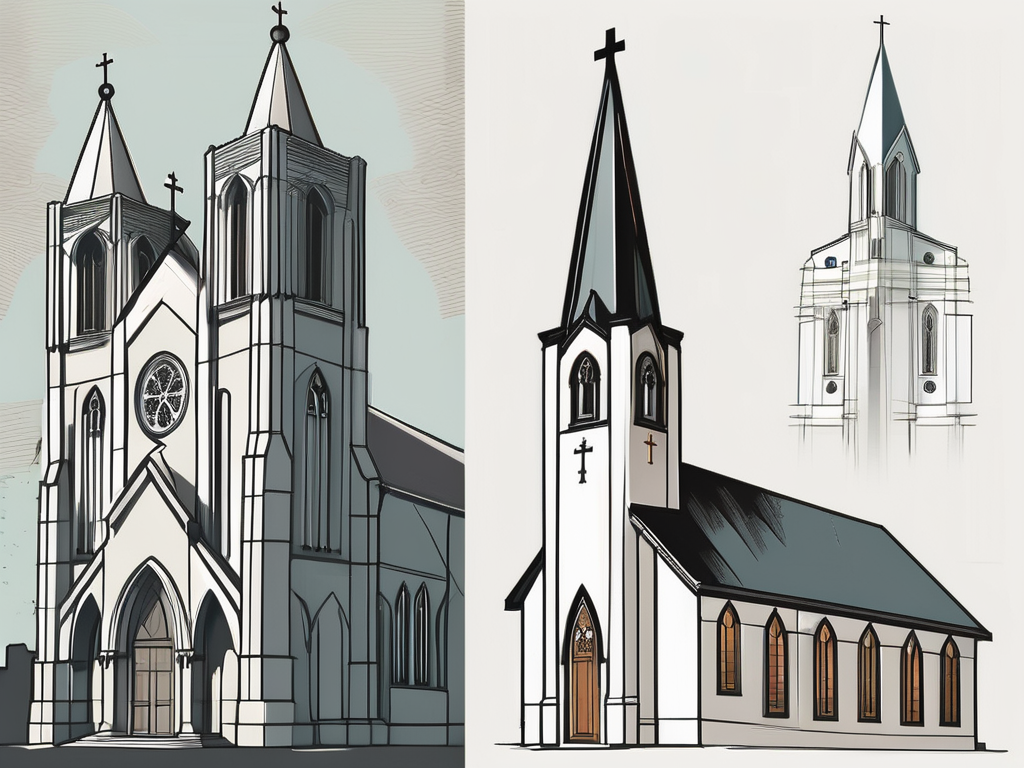In the realm of Protestant Christianity, the denominations of Presbyterian and Methodist both have deep-seated histories and distinct sets of beliefs and practices. Understanding the origins, core beliefs, worship styles, church governance, and sacraments of these two traditions is crucial for those seeking a better comprehension of this divide within Protestantism. In this article, we will delve into the differences and similarities between Presbyterianism and Methodism, shedding light on their unique characteristics and helping readers navigate the intricacies of these two faith traditions.
Understanding the Origins of Presbyterianism and Methodism
The Founding Principles of Presbyterianism
Presbyterianism traces its roots back to the Protestant Reformation of the 16th century. It was greatly influenced by the Swiss theologian John Calvin and his theological system known as Calvinism. Calvinism, a branch of Protestantism, emphasized the sovereignty of God and the belief in predestination, which states that God has already determined who will be saved and who will not. This theological framework provided the foundation for the development of Presbyterianism.
The term “Presbyterian” itself refers to the system of church governance, where elders, elected representatives of the congregation, hold authority alongside ordained pastors. This system of shared leadership ensures that decisions are made collectively and that the voices of the congregation are heard. It also promotes accountability and prevents the concentration of power in the hands of a few individuals.
In addition to its unique system of governance, Presbyterianism places a strong emphasis on the authority of Scripture. Presbyterians believe that the Bible is the inspired word of God and the ultimate guide for faith and practice. They prioritize the study and interpretation of Scripture, seeking to understand its teachings in order to live out their faith in a way that is consistent with God’s will.
Furthermore, Presbyterian worship services are characterized by their well-ordered nature. The liturgy is carefully planned and structured, with an emphasis on reverence and the participation of the congregation. Hymns, prayers, and readings from the Bible are integral parts of the worship experience, providing opportunities for reflection, praise, and communal worship.
Presbyterians also believe in salvation through faith alone, a key tenet of Protestant theology. They emphasize that salvation is a gift from God, received by grace through faith, and not something that can be earned through good works. However, they also believe that good works are important as evidence of a transformed life. Presbyterians strive to live out their faith by serving others, seeking justice, and promoting peace.
The Birth and Growth of Methodism
Methodism arose as a movement within the Anglican Church in 18th-century England, led by brothers John and Charles Wesley. Dissatisfied with the spiritual state of the Church of England, they sought to bring about a revival of personal piety and a deeper experience of faith.
The Wesley brothers, along with a group of like-minded individuals, formed what came to be known as the Holy Club at the University of Oxford. They engaged in rigorous spiritual practices, including regular prayer, Bible study, and acts of charity. Their methodical approach to spiritual growth earned them the nickname “Methodists.”
Methodism quickly spread beyond the confines of the university and gained popularity among the working class and marginalized communities. The movement offered a message of hope and redemption, emphasizing that salvation is available to all, regardless of social status or personal background.
Central to Methodism is the belief in personal holiness and the pursuit of a personal relationship with God. Methodists place a strong emphasis on the transformative power of God’s grace, which they believe can enable individuals to live holy lives and grow in their love for God and others.
Methodist worship services are characterized by their vibrant and participatory nature. Hymn singing, prayer, and Scripture reading are central components, but there is also room for spontaneous expressions of worship, such as testimonies and personal prayers. Methodists believe that worship is not just a Sunday activity but a way of life, and they seek to live out their faith in their daily interactions with others.
Methodism has had a significant impact on society, particularly in areas such as education, healthcare, and social justice. Methodists have been at the forefront of movements for social reform and have advocated for the rights of the poor, the oppressed, and the marginalized. They believe that faith should be put into action, and they actively work to make a positive difference in the world.
Core Beliefs: A Comparative Analysis
Theological Perspectives of Presbyterians
Presbyterians adhere to the theological principles set forth by John Calvin, emphasizing the sovereignty of God, divine election, and the supreme authority of Scripture. They believe that God’s grace is extended to all, but that individuals must respond to it through faith and obedience. The sacraments of baptism and the Lord’s Supper hold significant importance in their worship, serving as visible signs of God’s saving grace.
Presbyterians have a rich history that traces back to the Protestant Reformation in the 16th century. John Calvin, a prominent theologian and reformer, played a pivotal role in shaping the theological perspectives of Presbyterians. Calvin’s teachings emphasized the sovereignty of God, highlighting the belief that God is in control of all things and that His will cannot be thwarted. This theological emphasis on God’s sovereignty extends to the concept of divine election, which asserts that God chooses certain individuals for salvation based on His own purposes and not on any merit or worthiness on the part of the individual.
Presbyterians place a strong emphasis on the supreme authority of Scripture. They believe that the Bible is the inspired Word of God and serves as the ultimate guide for faith and practice. The study and interpretation of Scripture play a central role in Presbyterian worship and theological formation. Presbyterians engage in rigorous biblical exegesis and seek to apply the teachings of Scripture to their daily lives.
In addition to their theological beliefs, Presbyterians also place great importance on the sacraments of baptism and the Lord’s Supper. Baptism is seen as a visible sign of initiation into the Christian community and a symbol of God’s cleansing and forgiveness. The Lord’s Supper, also known as Communion or the Eucharist, is viewed as a sacred meal that commemorates the sacrificial death of Jesus Christ and serves as a means of grace for believers.
Fundamental Beliefs of Methodists
The core beliefs of Methodists align closely with mainstream Protestantism. They affirm the doctrine of the Trinity, the divinity of Jesus Christ, and salvation through faith in Him. Methodists embrace the Wesleyan Quadrilateral, which emphasizes the integration of Scripture, tradition, reason, and experience as sources of religious authority. This holistic approach underpins their belief that salvation is available to all through the grace of God.
Methodism emerged as a movement within the Anglican Church in the 18th century, led by John Wesley and his brother Charles Wesley. John Wesley, the founder of Methodism, sought to revitalize the Church of England and bring about spiritual renewal. He emphasized the importance of personal faith and the need for a transformative encounter with God’s grace.
Methodists affirm the doctrine of the Trinity, which asserts that God exists as three distinct persons – Father, Son, and Holy Spirit – in one divine being. They believe in the divinity of Jesus Christ, viewing Him as the Son of God who became incarnate to save humanity from sin and reconcile them to God. Methodists place a strong emphasis on salvation through faith in Jesus Christ, believing that individuals can experience a personal relationship with God through faith and receive forgiveness and eternal life.
The Wesleyan Quadrilateral is a distinctive feature of Methodist theology. It encompasses four sources of religious authority: Scripture, tradition, reason, and experience. Methodists believe that these four elements work together to inform their understanding of God and guide their beliefs and practices. Scripture serves as the primary source of authority, but tradition, reason, and experience also play important roles in shaping Methodist theology.
Methodists believe that salvation is available to all through the grace of God. They emphasize the concept of prevenient grace, which is the grace that God extends to all people, enabling them to respond to His offer of salvation. Methodists believe that individuals have the freedom to accept or reject God’s grace, but they affirm that God’s grace is sufficient for all and that salvation is ultimately a gift from God.
Worship Styles and Practices
Presbyterian Worship: A Closer Look
Presbyterian worship follows a structured liturgy with a focus on reverence and order. Services typically include Scripture readings, prayers, hymns, and a sermon. The centrality of the preached Word is integral to their worship, as sermons hold great importance in conveying biblical teachings and their application to daily life. The music in Presbyterian worship often consists of traditional hymns accompanied by organ or piano.
Presbyterian worship services are not limited to the Sunday morning gathering. Many congregations also have midweek services, such as Wednesday night prayer meetings or Bible studies, where members come together to deepen their understanding of the Word and seek God’s guidance.
One unique aspect of Presbyterian worship is the use of liturgical elements. These can include responsive readings, reciting creeds, and observing sacraments such as baptism and communion. These practices serve as a way to connect with the rich history of the Christian faith and express unity with believers across time and space.
Presbyterian churches often have a strong sense of community, and this is reflected in their worship. Members are encouraged to actively participate in the service, whether through singing hymns, offering prayers, or volunteering in various ministries. This active engagement fosters a sense of belonging and shared devotion to God.
The Methodist Approach to Worship
Methodist worship services are characterized by a dynamic and participatory nature. They often include elements such as congregational singing, contemporary worship music, responsive readings, and the celebration of the sacraments. Methodist sermons tend to be experiential, focusing on personal transformation, and inspiring individuals to live out their faith in tangible ways.
Methodist churches place a strong emphasis on the power of music in worship. In addition to traditional hymns, many congregations incorporate contemporary worship songs led by a praise band or choir. This blend of old and new creates a vibrant and diverse musical experience that appeals to people of different generations and backgrounds.
Methodists believe in the priesthood of all believers, which means that every member has a role to play in the worship service. This belief is reflected in their worship practices, as congregants are encouraged to actively participate through prayers, readings, and sharing personal testimonies. This active involvement creates a sense of ownership and responsibility for the worship experience.
Methodist churches also prioritize social justice and community outreach as part of their worship. Many congregations engage in various service projects and ministries, seeking to live out their faith by making a positive impact in their local communities and beyond.
Overall, Methodist worship is characterized by its lively and inclusive nature, inviting individuals to encounter God’s presence, experience personal transformation, and join in the mission of spreading God’s love to the world.
Church Governance and Structure
The Presbyterian Polity
Presbyterians have a representative form of church governance organized around a system of courts. Local churches are connected to regional presbyteries, which in turn are accountable to a larger governing body called a synod. Decisions within a Presbyterian denomination are made collectively through these courts, ensuring a balanced distribution of authority among elected leaders and pastors.
This system of church governance gives Presbyterians a sense of unity, accountability, and shared decision-making in matters of faith, doctrine, and practice.
The Methodist Episcopal System
Methodist churches follow an episcopal system of governance, which is hierarchical and emphasizes the role of bishops. Bishops oversee regional areas called annual conferences, where clergy and lay representatives gather to make decisions on matters of governance, missions, and the appointment of pastors to local congregations.
The episcopal structure instills a sense of connection and accountability to the larger Methodist tradition. It ensures that clergy members are appointed to serve in specific areas based on the needs of the conference and the guidance of the bishop.
Sacraments and Rituals
Sacraments in the Presbyterian Tradition
Presbyterians recognize two sacraments: baptism and the Lord’s Supper. Baptism is seen as an initiation into the Christian community, signifying the cleansing of sins and the reception of God’s grace. The sacrament of the Lord’s Supper, also known as communion or the Eucharist, is viewed as a remembrance and celebration of Christ’s sacrifice and ongoing presence.
Presbyterians often have a high regard for the sacraments, considering them as channels of grace, spiritual nourishment, and expressions of communal unity.
The Methodist View on Sacraments and Rituals
Methodists uphold the same two sacraments as Presbyterians, baptism and the Lord’s Supper. Baptism represents regeneration and initiation into the Church, symbolizing the washing away of sins and the infusion of divine grace. Methodists also view the Lord’s Supper as a means of grace that fosters a deeper connection with Christ and fellow believers.
While both traditions emphasize the importance of the sacraments, Methodists place additional emphasis on other spiritual practices, such as prayer, fasting, and acts of mercy, as means of growing in faith and holiness.
In conclusion, while Presbyterianism and Methodism share some similarities as Protestant denominations, they also diverge in key aspects of theology, worship, church governance, and sacraments. Understanding the intricacies and nuances of these traditions offers valuable insights into the diverse tapestry of Christian belief and practice. Whether choosing to align with Presbyterianism or Methodism, or simply seeking a better understanding of Christian denominations, exploring these differences can help individuals navigate their own spiritual journey with a more informed perspective.


